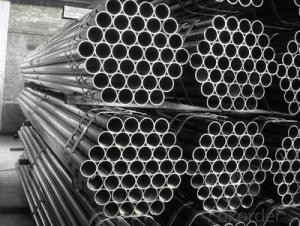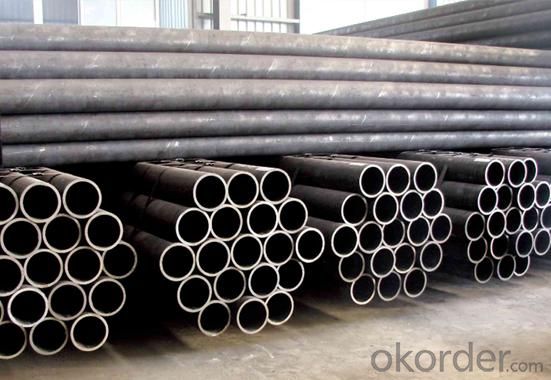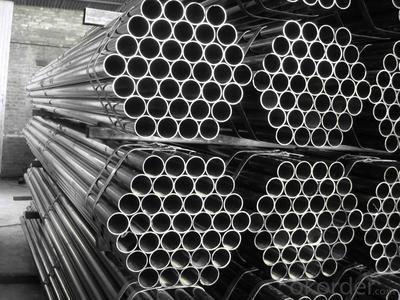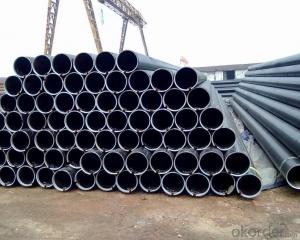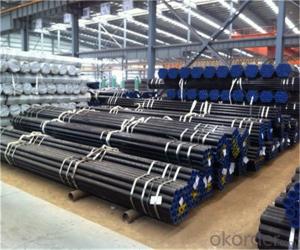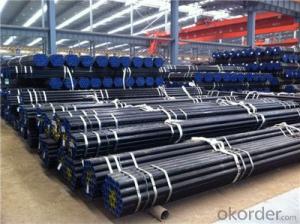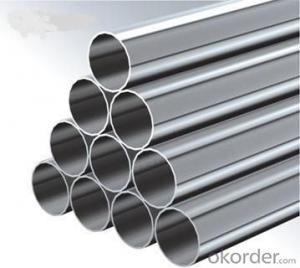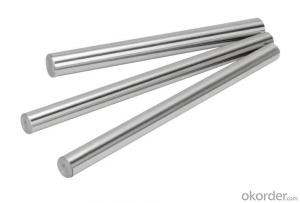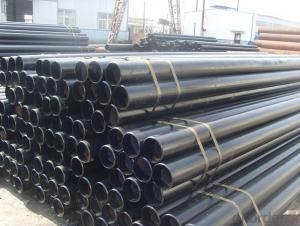Carbon Steamless Steel Pipe With Best Quanlity
- Loading Port:
- Tianjin
- Payment Terms:
- TT or LC
- Min Order Qty:
- 30 m
- Supply Capability:
- 9000 m/month
OKorder Service Pledge
OKorder Financial Service
You Might Also Like
1、Structure of Seamless Pipe ASTM A106/53:
Seamless pipe is formed by drawing a solid billet over a piercing rod to create the hollow shell. As the manufacturing process does not include any welding, seamless pipes are perceived to be stronger and more reliable. Historically seamless pipe was regarded as withstanding pressure better than other types, and was often more easily available than welded pipe.
Seamless Steel Pipe
Standard:API ASTM DIN
Size:OD:21.3mm-609.6mm
WT:1mm-40mm
standard | grade | Tensile strength(MPA) | yield strength(MPA) |
ASTM A106 | A | ≥330 | ≥205 |
B | ≥415 | ≥240 | |
C | ≥485 | ≥275 |
2、Main Features of the Seamless Pipe ASTM A106/53:
• High manufacturing accuracy fast delivery time
• High strength long life good quality
• Small inertia resistance
• Strong heat dissipation ability
• Good visual effect
• Reasonable price
3、Seamless Pipe ASTM A106/53 Specification:
Standard | GB, DIN, ASTM ASTM A106-2006, ASTM A53-2007 |
Grade | 10#-45#, 16Mn 10#, 20#, 45#, 16Mn |
Thickness | 8 - 33 mm |
Section Shape | Round |
Outer Diameter | 133 - 219 mm |
Place of Origin | Shandong, China (Mainland) |
Secondary Or Not | Non-secondary |
Application | Hydraulic Pipe |
Technique | Cold Drawn |
Certification | API |
Surface Treatment | factory state or painted black |
Special Pipe | API Pipe |
Alloy Or Not | Non-alloy |
Length | 5-12M |
Outer Diameter | 21.3-610mm |
Grade | 20#, 45#, Q345, API J55, API K55, API L80, API N80, API P110, A53B |
Standard | ASME, ASTM |
4、Packaging & Delivery
Packaging Details: | seaworthy package,bundles wrapped with strong steel strip |
Delivery Detail: | 15-30days after received 30%TT |
5、FAQ of Seamless Pipe ASTM A106/53:
①How is the quality of your products?
Our products are manufactured strictly according to national and internaional standard, and we take a test
on every pipe before delivered out. If you want see our quality certifications and all kinds of testing report, please just ask us for it.
Guaranteed: If products’ quality don’t accord to discription as we give or the promise before you place order, we promise 100% refund.
②How about price?
Yes, we are factory and be able to give you lowest price below market one, and we have a policy that “ for saving time and absolutely honest business attitude, we quote as lowest as possible for any customer, and discount can be given according to quantity”,if you like bargain and factory price is not low enough as you think, just don’t waste your time.Please trust the quotation we would give you, it is professional one.
③Why should you chose us?
Chose happens because of quality, then price, We can give you both.Additionally, we can also offer professional products inquiry, products knowledge train(for agents), smooth goods delivery, exellent customer solution proposals.Our service formula: good quality+good price+good service=customer’s trust
SGS test is available, customer inspection before shipping is welcome, third party inspection is no problem.
6、Seamless Pipe ASTM A106/53 Images:
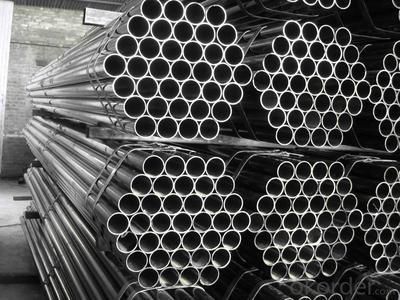
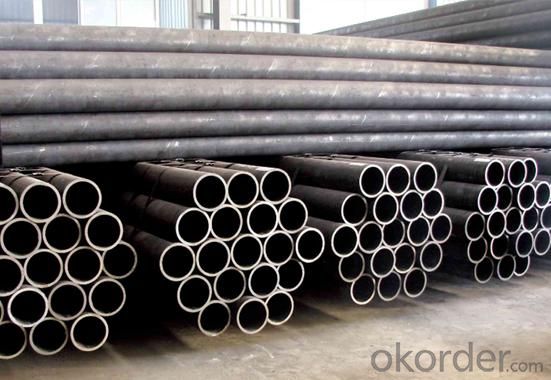
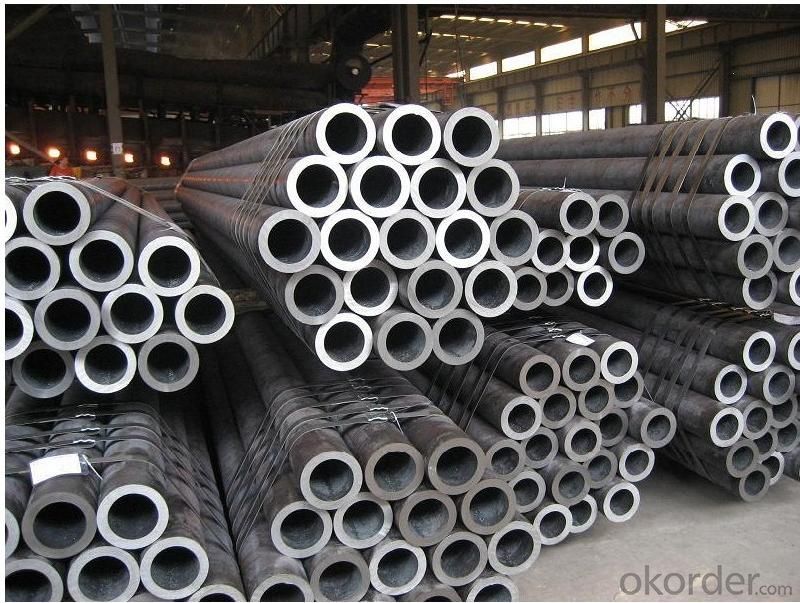
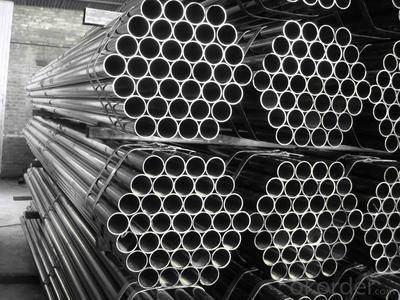
- Q: How are steel pipes used in the automotive manufacturing industry?
- Steel pipes are commonly used in the automotive manufacturing industry for various purposes such as exhaust systems, fuel lines, and structural components. They provide durability, strength, and resistance to high temperatures, making them ideal for these applications.
- Q: What are the different types of supports used for aboveground steel pipes?
- There are several types of supports used for aboveground steel pipes, including pipe hangers, pipe shoes, pipe clamps, and pipe rollers. These supports are designed to provide stability, prevent sagging, and distribute the weight of the pipe evenly, ensuring the structural integrity of the system.
- Q: What are the properties of steel that make it suitable for pipe manufacturing?
- Due to its unique properties, steel is highly favored as a material for manufacturing pipes. The exceptional strength and durability of steel allow it to withstand high pressure and extreme temperatures, ensuring the safe transportation of fluids and gases over long distances without the risk of leakage or breakage. Another significant advantage of steel is its resistance to corrosion. Unlike other materials that can degrade when exposed to corrosive substances such as water, chemicals, and gases, steel remains highly resistant to corrosion. This quality makes steel pipes long-lasting and reliable. Furthermore, steel is a versatile material that allows for the production of pipes in various sizes and shapes. This flexibility enables customization to meet specific project requirements, making steel pipes suitable for a wide range of applications, including water supply, oil and gas transmission, sewage systems, and structural support. Moreover, steel possesses excellent thermal conductivity, which is crucial for applications involving the transportation of hot or cold fluids. Steel pipes efficiently transfer heat, ensuring minimal energy loss during the process. Additionally, steel is an environmentally friendly option for pipe manufacturing due to its recyclability. Steel pipes can be recycled and reused, reducing the demand for new raw materials and minimizing waste generation. In conclusion, the properties of strength, durability, corrosion resistance, versatility, thermal conductivity, and recyclability make steel the ideal choice for pipe manufacturing. These properties guarantee the reliability, efficiency, and longevity of steel pipes in various industries and applications.
- Q: What is the flexibility of steel pipes?
- Steel pipes are known for their exceptional flexibility, making them highly versatile and suitable for a wide range of applications. The flexibility of steel pipes refers to their ability to bend and withstand various forms of stress without breaking or deforming. This flexibility is primarily due to the inherent properties of steel, such as its high tensile strength and ductility. Steel pipes can be bent and formed into different shapes without compromising their structural integrity. This allows for easier installation and routing around obstacles, making them more adaptable for complex plumbing or piping systems. Additionally, the flexibility of steel pipes enables them to withstand external forces, such as ground movements or temperature fluctuations, without experiencing significant damage. The flexibility of steel pipes also makes them suitable for applications that require dynamic movement or expansion. For instance, in oil and gas pipelines or in heating and cooling systems, where temperature variations can cause expansion and contraction, steel pipes are able to accommodate these changes without causing leaks or failures. Furthermore, the flexibility of steel pipes contributes to their durability and longevity. The ability to withstand bending and stress helps prevent the formation of cracks or fractures that can lead to leaks or structural failures. This characteristic makes steel pipes a reliable choice for demanding environments, including high-pressure systems or corrosive conditions. In summary, the flexibility of steel pipes is a crucial attribute that allows for easy installation, adaptability to various conditions, and long-term reliability. With their exceptional flexibility, steel pipes are widely preferred in numerous industries and applications where strength, durability, and versatility are essential.
- Q: What are steel pipes used for?
- Steel pipes find extensive use in a diverse range of industries, serving various purposes. Among the most prevalent applications, steel pipes are commonly employed for the transportation of fluids and gases. In oil and gas pipelines, for instance, steel pipes are utilized to convey oil, natural gas, and other petroleum products across long distances. Additionally, steel pipes are utilized in domestic and industrial water supply systems. Within the construction industry, steel pipes play a pivotal role in structural tasks, offering exceptional strength and durability. Consequently, steel pipes are highly suitable for the construction of buildings, bridges, and other infrastructure projects. Due to their capacity to withstand heavy loads and provide stability, steel pipes are also employed in the construction of high-rise buildings. Moreover, the manufacturing industry heavily relies on steel pipes. These pipes are utilized in the production of machinery, equipment, and vehicles. In bulk handling systems, steel pipes are commonly employed to transport materials like coal, ore, and grain. Furthermore, steel pipes contribute to the manufacturing of automotive components such as exhaust systems, chassis, and suspension parts. In the energy sector, steel pipes serve a multitude of purposes. For instance, they are employed in power plants for the transportation of steam and hot water, as well as in the production and distribution of electricity. Additionally, steel pipes are utilized in the renewable energy sector, particularly in the construction of wind turbine towers and solar panel frameworks. In addition to these primary applications, steel pipes are also utilized in plumbing systems, irrigation systems, and the construction of fences and railings. Their versatility allows for customization, meeting specific requirements in terms of size, thickness, and coating. Ultimately, steel pipes fulfill an indispensable role across numerous industries, facilitating the transport of fluids, the construction of infrastructure, and the manufacturing of various products. Their strength, durability, and adaptability make them a preferred choice among engineers and professionals in various fields.
- Q: What are the different types of threading on steel pipes?
- There are several types of threading commonly used on steel pipes, including tapered or NPT (National Pipe Taper), straight or NPS (National Pipe Straight), and British Standard Pipe (BSP) threading. These different types of threading are designed to ensure a secure and leak-free connection between pipes and fittings.
- Q: What are the dimensions of a standard steel pipe?
- The dimensions of a standard steel pipe can vary, but commonly, they range from 1/8 inch to 72 inches in diameter and have a standard length of 21 feet.
- Q: Can steel pipes be used for underground sprinkler systems?
- Yes, steel pipes can be used for underground sprinkler systems. However, it is important to note that steel pipes are not as commonly used as other materials like PVC or polyethylene due to their susceptibility to corrosion. If steel pipes are chosen for this application, they should be coated or lined to protect them from underground moisture and ensure their longevity.
- Q: How are steel pipes used in the manufacturing of food processing equipment?
- Steel pipes are commonly used in the manufacturing of food processing equipment due to their durability, strength, and resistance to corrosion. These pipes are used to transport various food products such as liquids, powders, and gases within the equipment. They are also utilized in the construction of frames, supports, and structures for food processing machinery, ensuring stability and longevity. Additionally, steel pipes are often employed in the creation of heat exchangers, which are crucial for heating or cooling purposes in food processing equipment.
- Q: DN150 welded steel tubes one meter multiple
- The theoretical weight table of welded steel pipe (Kg) can be checked, and the outer diameter and wall thickness can be measured according to the formula.For example: DN150 welded steel pipe, diameter 165mm, thickness 4.5mm, weight kg per meter.Welded steel pipe theoretical weight (Kg/m) = (165-4.5) * 4.5 * 0.02466=17.81Kg
Send your message to us
Carbon Steamless Steel Pipe With Best Quanlity
- Loading Port:
- Tianjin
- Payment Terms:
- TT or LC
- Min Order Qty:
- 30 m
- Supply Capability:
- 9000 m/month
OKorder Service Pledge
OKorder Financial Service
Similar products
Hot products
Hot Searches
Related keywords
